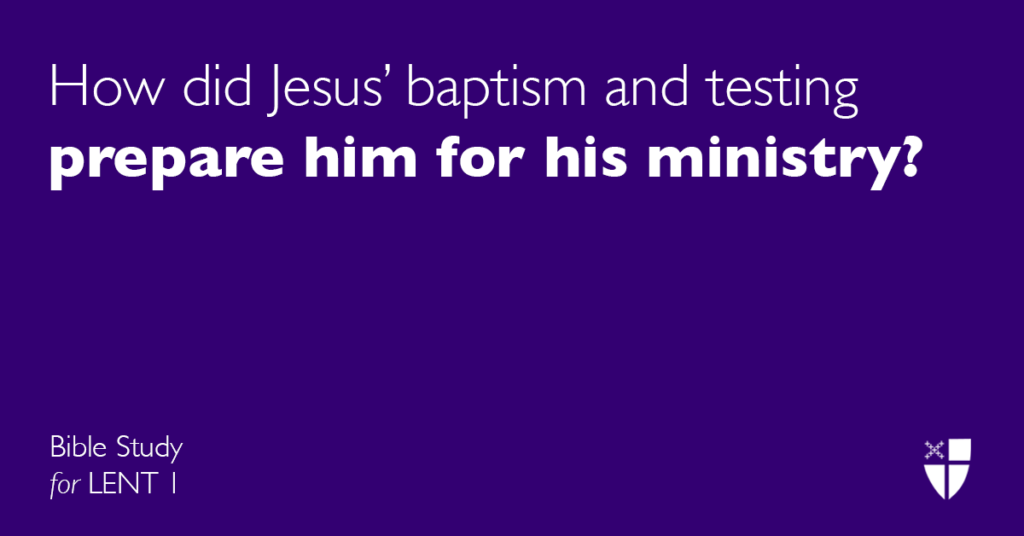This page is available in: Español
Bible Study: Lent 1 (B) – 2021
February 21, 2021
RCL: Genesis 9:8-17; Psalm 25:1-9; 1 Peter 3:18-22; Mark 1:9-15

Genesis 9:8-17
The covenant that God establishes here is an unusual covenant. Most covenants are between two entities, with the more powerful one promising protection and provision and the less powerful one promising fealty. Here, however, God establishes a covenant with not just Noah, but with “every living creature of all flesh that is on the earth.” Noah is merely a stand-in entity; God makes this promise to the billions and billions of creatures, both human and animal, who will call Earth home. Further, despite the fact that the first flood was the consequence of humanity’s evil, God requires no promises from humanity in this covenant. God will never destroy the earth by flood again, even though humanity is still sinful and will forsake God again. The rainbow is God’s pledge to us of this unusual covenant: a sign visible to all generations that God will remember God’s abundant promises.
- What kind of a God makes a one-sided, everlasting covenant with humanity? What aspects of God’s character does this passage highlight?
- God promises to remember this covenant through the rainbow. What does it mean for us as humans to remember this covenant?
Psalm 25:1-9
“God is God. I am not God. That is a very good thing.” Early in my development as a Christian leader, a mentor encouraged me to tell myself that regularly. The Psalmist here has a clear understanding of his position before God, as he cries out in trust and faith, a position which we can imitate today. We entrust our souls to God; we trust God for justice for the wicked; we trust God to teach us truth; we trust God to remember God’s compassion and love but to forget our sinfulness; we trust God to show us God’s paths of love and faithfulness so that we may walk in them. We cannot do any of these things for ourselves; we are wholly dependent on God. In each act of trust, we remember our place before our God who loves us and offers us forgiveness, which we accept in humility and gratefulness.
- In what ways in your own life have you seen evidence of God’s guidance, love, and faithfulness?
1 Peter 3:18-22
In the days of Noah, the sinful world was buried in a flood, and by God’s grace, Noah and those with him were saved in the ark – saved both from the waters of the flood and through the waters of the flood as the ark floated on them. Today, we experience salvation through the waters of baptism. We are buried with Christ in the waters, and through Christ’s suffering, death, and resurrection, we are forgiven for our sins and granted a clean conscience before God. Christ’s ascent into heaven and his victory over all authorities and powers assure us that this is true.
In baptism, God makes promises to us, the same way that God made a covenant with Noah after the flood. God is faithful to God’s promises, and this faithfulness helps us to keep the promises we make in our baptismal covenant, to be faithful to God and to respect the dignity of all human beings.
- What encouragement can we find by remembering our baptism and baptismal covenant?
Mark 1:9-15
Jesus spends forty days in the wilderness, surrounded by wild animals and tempted by Satan. However, before he enters the wilderness, he is baptized and given a concrete reminder of his identity as God’s Son and God’s Beloved, which must have been a comfort and encouragement to him during his ordeal. When he returns, he is ready to begin his ministry by proclaiming the good news of the kingdom of God.
This mirrors our experience in Lent. As we begin our forty days of fasting and repentance, the lectionary readings remind us of our baptismal identity. We are God’s children and God’s beloved, and God’s promises of forgiveness will sustain us during these forty days. After Lent is over, we will proclaim Jesus’ resurrection and God’s kingdom during the season of Easter.
May we find comfort and hope in the promises of our Savior during this season of repentance.
- How did Jesus’ baptism and testing prepare him for his ministry?
- How do our baptisms and seasons of repentance ready us for ministry?
This page is available in: Español
Don’t forget to subscribe to the Sermons That Work podcast to hear this sermon and more on your favorite podcasting app! Recordings are released the Thursday before each liturgical date.
Receive Free Weekly Sermons That Work Resources!
This page is available in: Español


